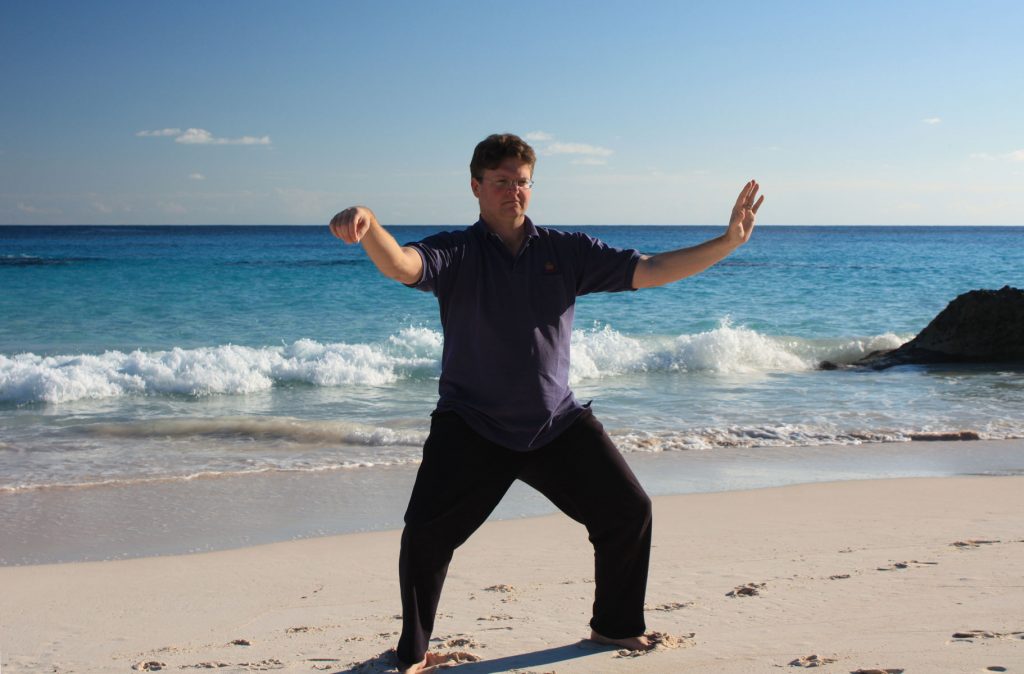
The teacher leads to the door,
The practice is for the individual.
The Golden Mean: Strain is not gain
The most important principle in the internal arts is the Golden Mean. This means that you should not do anything to the point of straining yourself physically, energetically, emotionally or mentally. When you begin to feel any kind of tension, strain or pain you have gone beyond your comfortable range. Whenever you reach this point you have gone too far, next time do less. Going slowly allows you to notice when you are nearing the end of your comfortable range so that you can change direction before moving into strain.
Staying within your comfortable range will allow your body to release open. As it does so your range will grow. The golden mean is about being like an energy efficient light bulb: producing the most light (maximum flow/power) for the least possible expenditure of energy.
Not demanding perfection
It is quite common for people not to practise because they feel that they will get it wrong. This is a one of the largest barriers to improvement. Practise whatever you can remember, even if you know that you are not doing it quite right. As long as your knees are not hurting whatever you do will benefit you.
If you practise what you know regularly you will quickly have something to work on and improve. Whenever you come to class you will learn or be reminded of another piece of the puzzle. This will allow you to correct what you have been practising at home. You will soon find that you remember more each time and can practise more accurately.
Remember you do not have to do these postures and movements perfectly to get a great deal of benefit. In fact no one has ever done Tai Chi, Neigong or Qigong perfectly. It is working slowly and gently in a certain direction (towards the ideal of balance, openness and connected flow etc) that will make our journey smoother, happier and healthier.
The best time to practise
The simple answer is any time is better than never. Traditionally two hours before dawn is considered best. Whatever time you choose, try to do it at about the same time each day. Find what works best for you. Usually it is better not to practise just after eating.
Practising before bed
Some people find that if they practise too close to the time they go to bed that they cannot sleep. This can be anywhere from five minutes to two hours or more. Others find that it can help them get to sleep. The only way to find out is by trial and error.
How long to practise
At first it is easiest to get into the habit of regular practise by doing a few minutes each day. Do it when you are waiting for the kettle to boil or when the ads come on when you are watching TV. Over time as you find that the body likes it, gradually build up the time according to your comfortable range. A little every day is much better than a lot once a week.
Why Tai Chi Fundamentals?
A complete health and healing system in its own right, Tai Chi Fundamentals (TCF) is the easiest and most effective way to learn all of the essential alignment and movement principles of Tai Chi, making it much easier to learn a Tai Chi form. Learning TCF first will save you from many of the bad habits that people develop when they only learn the Tai Chi Form. It will also help you protect your knees and spine. If you have already learned a form, TCF will help you to stabilise your alignments and to embody many of the more subtle aspects of the form that often elude many people.
Special note for women
Tai Chi, Qigong and Neigong increase blood circulation. You may find that practising while you are menstruating increases the flow. If so it is better not to practice during your period.
Making the most of relaxation
The internal arts are some of the most effective relaxation methods available. Many people have told us that they have never felt as relaxed as after one of our classes. This is the power of letting go.
Relaxation brings innumerable benefits including increased circulation, stress reduction and strongly enhancing the body’s ability to heal itself.
To make the most of these benefits, especially when something significant happens, we recommend that you take things very gently for the rest of the day. Allow your system to adjust to and deeply absorb its new level of openness. If you give yourself the time early on, and practise what you learned for the next few days you will greatly increase the likelihood of making the change permanent.
If, however, you take your new body and use it to do something very strenuous (work or play) you will use up what you have newly acquired and you will end up where you started. This is a very short term approach, which will prevent you from gaining the profound benefit you could have had. Worse still you may injure yourself since you have opened up your system and then put great strain on it before it could stabilise itself at its new level.
Releases
As your system opens up, things that have been stuck can begin to move. As the tissues of the body open, parts of the body may involuntarily twitch or shake. This is similar to water starting to move through a blocked pipe that is beginning to clear.
Moving and opening the internal organs can cause toxins that have built up in them to be released and you may feel a bit nauseous. If this happens, rest and drink plenty of water to flush the toxins from your system. Blocked emotions can also be released and you may suddenly feel waves of anger, fear, grief, anxiety or even joy. These are emotional memories that have been trapped in your body. Allowing them to play themselves out, without getting caught up in them again, will free you of them.
Drinking Bird
When learning the “Drinking Bird” exercise in the Tai Chi Fundamentals classes it is relatively common for people to experience extremely vivid dreams. If this occurs reduce the number you do (which should never be more than three in a day) and the degree to which you do it. The dreams are a form of clearing and releasing and do not tend to last for many nights.
More about emotional releases
It is quite common for these practices to bring up old feelings from your past. Emotions, at the end of the day are a specific type of energy and the internal arts free up the energy of many different layers of your being. The good news is that if you keep practising and letting these feelings go, they will be cleared from your system and you will be free of them. The bad news is that while you clear them you will feel them – good, bad and indifferent.
While this work is not particularly comfortable, it might make it easier if you think of these feelings as emotional memories (which they are). You felt these things a long time ago and they got stuck inside you, just as an old injury can get stuck inside you. When someone feels an old injury release they don’t tend to confuse it with a present injury, since there is usually a wound that they can see and touch. But it is a bit trickier with emotional blockages as they are harder to distinguish from something that is happening right now, but it is possible to make this distinction. Over time you can get to a place where you can watch (and feel) the emotions release without being caught up in them. Remember, you are not your emotions, just as the sky is not the clouds.
Do your best not to act on, or speak from, these emotions, you do not want to practise them, as that would strengthen them and embed them deeper into your system. Also try not to blame anyone for how you are feeling, even yourself. That is just a distraction that will keep you from letting go of what is coming out. These are very good opportunities for practising compassion with yourself and then with others.

